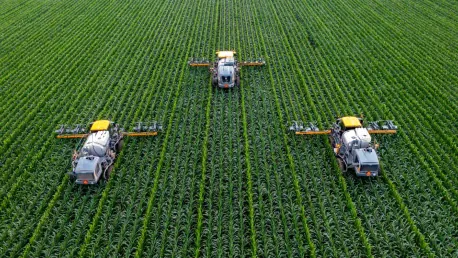The agriculture sector is experiencing a groundbreaking transformation driven by digital farming, artificial intelligence (AI), and the Internet of Things (IoT). Traditional methods, heavily reliant on historical data and intuition, are becoming increasingly ineffective in confronting the skyrocketing global food demand and the pervasive impacts of climate change. In this era, these new technologies offer innovative solutions to enhance productivity, build resilience, and promote sustainability in farming practices. As climate patterns fluctuate and food scarcity intensifies, the need to integrate AI and IoT into agriculture has never been more pressing. These technologies provide the data-driven insights necessary to adapt to environmental changes swiftly and accurately, securing food supplies for future generations.
Addressing Food Insecurity with Technology
The 2024 State of Food Security and Nutrition in the World Report highlights the urgent reality that a significant portion of the global population is grappling with hunger, with one in five people in Africa particularly affected. As the world’s population is projected to soar to nearly ten billion by 2050, it becomes paramount to adopt technology-based solutions to meet this burgeoning food demand. AI and IoT technologies present a remarkable opportunity to revolutionize traditional farming methods by offering real-time, data-driven insights that significantly improve efficiency and crop yields.
Farmers today must navigate a complex array of variables such as unpredictable weather patterns, fluctuating market demands, and varying water availability. Conventional methods for predicting crop yields often fall short, leading to inefficient resource use and inconsistent outcomes. By leveraging AI and IoT, farmers can access more accurate and timely data, enabling them to make better-informed decisions. This not only enhances productivity but also boosts profitability, ensuring a more stable and secure food supply chain. The transformation from intuition-based farming to data-driven agriculture marks a crucial step in mitigating the impacts of food insecurity exacerbated by climate change.
Precision Agriculture and Crop Health
Digital farming, or precision agriculture, takes agricultural practices to the next level by optimizing every aspect of farming through the use of advanced devices and tools. IoT devices, for instance, can monitor critical factors such as soil health, temperature, humidity, and lighting. These comprehensive insights allow farmers to take proactive measures to maintain optimal crop health, preventing common issues like over-fertilization, which can be detrimental to both the environment and crop yields.
AI has emerged as a game-changer in tackling agricultural inefficiencies. From detecting crop diseases to managing weed control systems and predicting crop yields with unimaginable accuracy, AI is revolutionizing traditional farming practices. Notably, research from University Mohammed VI Polytechnic demonstrated an AI model capable of predicting maize yields with 87% accuracy. This remarkable precision not only bolsters food security but also holds particular significance for regions heavily reliant on staple crops such as maize. By adopting these AI-driven solutions, farmers can transition from uncertainty to efficiency, ensuring sustainable agricultural practices that can withstand the challenges posed by climate change.
Fertilizer Management and Soil Health
Fertilizer management is a critical factor in maintaining soil health and promoting sustainable farming practices. Overuse of fertilizers can lead to soil depletion, water contamination, and biodiversity loss, while underuse weakens the soil by depleting essential nutrients. This delicate balance requires precise management, and AI technology steps in to fill this gap by analyzing detailed soil data to provide exact recommendations. AI-driven approaches ensure that each plant receives the nutrients it needs, optimizing fertilizer use and enhancing crop yields.
The advancements of AI-driven soil management have shown significant promise, with potential increases in crop yields of up to 20% while simultaneously reducing water and fertilizer use by 15%. These improvements are crucial for achieving sustainable farming practices that can meet growing food demands without compromising environmental health. Through intelligent fertilizer management, farmers can ensure long-term soil fertility and ecosystem balance, reinforcing the foundations of sustainable agriculture.
Water Conservation in Agriculture
Water scarcity stands as a pressing global concern, affecting billions of people worldwide and necessitating more efficient water use in agriculture. The sector currently consumes a staggering 70% of global water withdrawals, exacerbating water stress and highlighting the urgency for innovative solutions. AI can play a pivotal role in addressing this challenge through smart irrigation systems, leak detection monitoring, and water demand forecasting. These advancements enable farmers to optimize water use, ensuring that crops receive the right amount of water at the right time.
Innovative techniques such as vertical farming, which involve growing crops in stacked layers using artificial lighting, further propel water conservation efforts by reducing water usage by up to 98% compared to traditional farming methods. By adopting these technological advancements, farmers can significantly decrease water consumption, promote water conservation, and ensure the sustainability of agricultural practices. This holistic approach is vital for overcoming the water scarcity challenge and preserving this precious resource for future generations.
Scaling Solutions for a Resilient Future
The 2024 State of Food Security and Nutrition in the World Report underscores an alarming truth: a substantial portion of the global population faces hunger, with one in five people in Africa particularly impacted. As the global population is expected to near ten billion by 2050, embracing technological solutions becomes essential to address the growing food demand. AI and IoT technologies offer incredible potential to transform traditional farming practices, giving real-time, data-driven insights that drastically enhance efficiency and crop yields.
Farmers today contend with a variety of complex variables like unpredictable weather, fluctuating market demands, and inconsistent water availability. Traditional methods for predicting crop yields often prove inadequate, causing inefficient resource use and erratic results. By utilizing AI and IoT, farmers gain access to more precise and timely data, allowing for better-informed decisions. This not only increases productivity but also boosts profitability, ensuring a more stable food supply chain. Shifting from intuition-based to data-driven agriculture is a pivotal step in mitigating the food insecurity crisis heightened by climate change.









